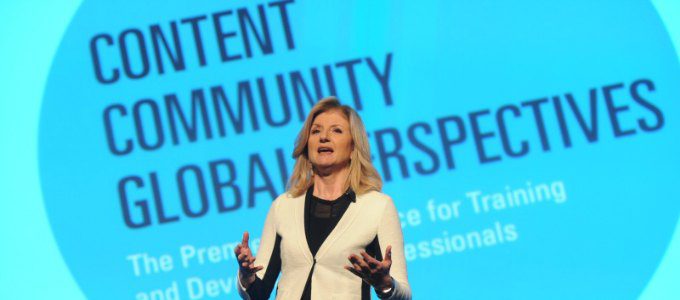
Editor Kellye Whitney recaps the first day of 2014's ASTD Conference and Exposition.
by Kellye Whitney
May 6, 2014
It was the best of times, it was the worst of times. OK, that’s dramatic. It was, in fact, my first time at the ASTD conference, held this week in D.C., and I had a great time. But a theme quickly emerged on the first day of the show: too much can be too much, and in some cases, not nearly enough.
More than one person seemed to advocate change. Not just change in learning but in our lives. These voices didn’t seem to think a coup was necessary. For many, little changes were all that was needed to produce big results.

Before Arianna Huffington took the stage to deliver the opening keynote, ASTD President and CEO Tony Bingham talked about the rapid pace of business and the intense level of change associated with it if organizations are innovating at the rate they need to in order to survive and thrive. Learning leaders, he said, have to be transformative leaders.
Then Huffington talked about her new book “Thrive: The Third Metric to Redefining Success and Creating a Life of Well-Being, Wisdom, and Wonder.” After she injured herself in a fall — breaking her cheekbone and requiring stitches for a cut in her eye — a fall prompted by exhaustion, she had an epiphany of sorts: working to the point of exhaustion burn out? Not worth it.
Huffington referenced brain science to help make her point that it’s far better for leaders concerned with change to take good care of themselves, disconnecting from technology, getting adequate sleep and placing value on more than money and power as we work ourselves silly. She suggested one small step — like going to bed a half hour earlier — is all it takes to start on the road to overwork recovery.
She said she realized that she wasn’t missing much if she stopped ingesting news nearly 24 hours a day, but willfully disconnecting did mean more time with her daughters. She believes so strongly in the power of sleep as a restorative measure with which to improve the quality of one’s work and life that she has even installed nap rooms in her office for employees.
I held meetings with a few vendors who seemed to echo that idea. Not about the power of naps, but the value of small things. Carol Leaman, CEO of Axonify, an e-learning company, talked about how consistent, incremental learning offerings have helped some of her clients save millions, in the case of one big box retailer, many millions. These companies were investing big in more traditional learning programs that didn’t fare so well in knowledge retention.
Small changes like incremental or modular learning offerings can lead to big changes in behavior and bottom-line cost savings. Quick naps or making small changes in one’s daily routine can enable creativity and increase one’s joy in potentially everything.
When thoughtfully done, small changes can equal big benefits in learning and in life.



